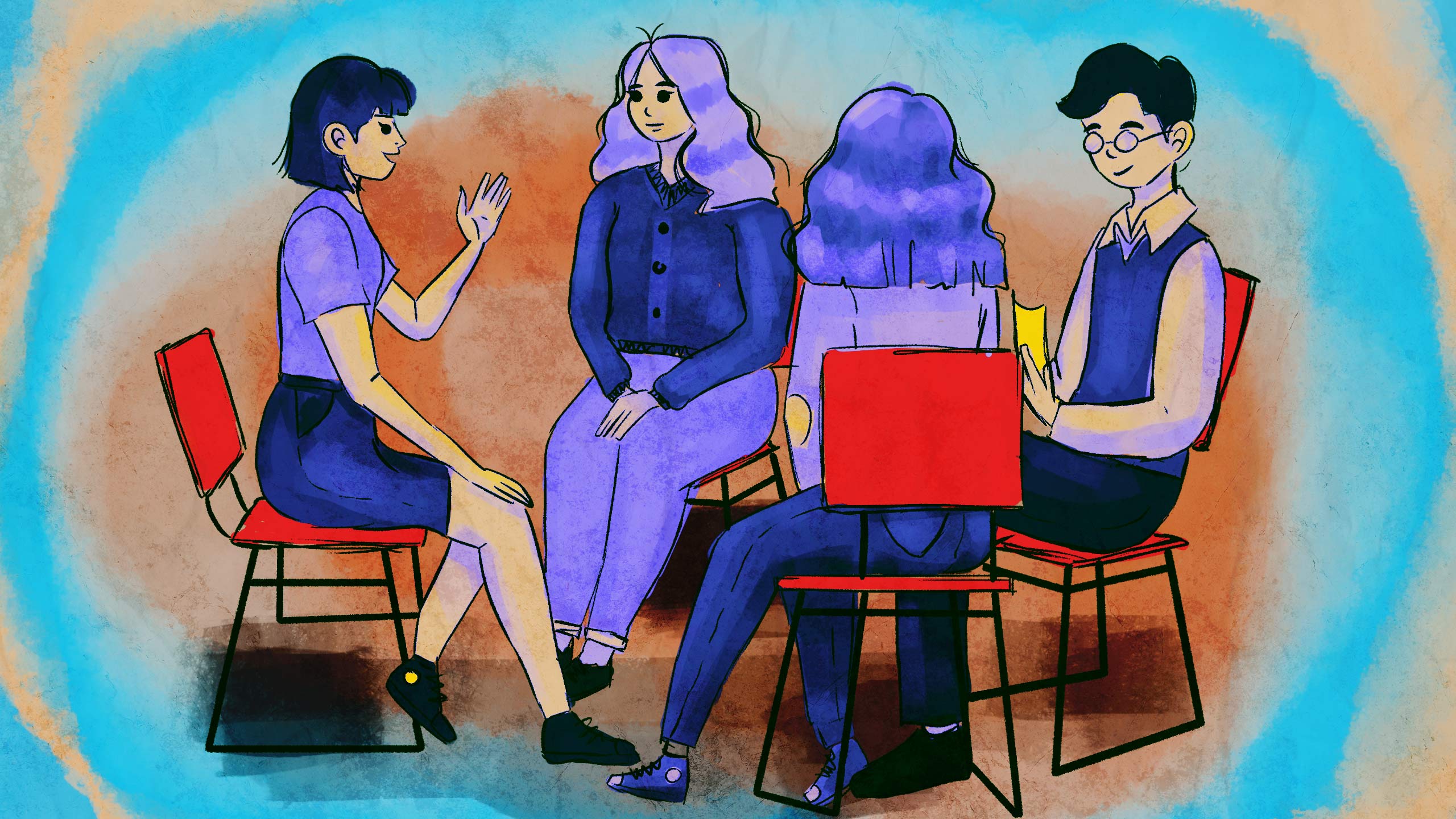
7 Benefits of Going to Group Therapy That You Wouldn’t Expect
That there was a time in human history when we would gather around the fire and tell stories.
Maybe we told legends with heroes and villains. Maybe they were true tales of braving a terrible winter, warnings of dangerous animals afoot, or ghost stories of a haunted forest. They might have been love stories or recollections of people who were close to us. Swapping stories is an ancient tradition.
While group therapy may not take place by a fire on a dark and stormy night, it has some similarities to days of old. You gather in a safe and sacred space to express yourself vulnerably and hear other people’s vulnerable shares. A therapist facilitator provides safety and can offer their professional insight, giving you even more material to learn from. Group therapy fosters authentic expression and can be a blessing in our media-saturated, superficial world.
If you’re already in individual therapy, you might not see the benefit of joining a group. But even therapists don’t always fulfill all your needs (plus, they’re pretty pricey). Sometimes being in a community is what’s most important. In this article, you’ll learn how group therapy can give you an outside perspective, help you learn about yourself, provide you a sense of belonging, and so much more.
Healing Through Storytelling
Group therapy involves sharing your story and listening to those of others. That’s powerful in and of itself because stories are innately healing. As story expert, author, clinical psychoanalyst, and ethnologist Clarissa Pinkola Estes has said, we don’t have to do anything to receive the medicine of stories — just telling them and reading (or listening) to them is enough.
In group therapy, you get to hear other people’s tales: Their love and loss, their hope and despair. They may not be yours exactly, but they’ll have universal elements. This creates a sense of kinship and activates your own imagination and intuition, helping you tap into what your subconscious is trying to tell you.
Stories and myths have always had the power to heal us. They stimulate our collective imagination by touching on themes that are common to the human condition. We’re all in our own heroine’s or hero’s journey as we go through life. Like your favorite fantasy novels, we endure tests and enemies, have allies and guides, can draw on gifts, and must master our weaknesses. We all have our own Mordor to contend with, whether it’s experiencing bullying as a child, mastering self-doubt as an adult, or navigating the shocking loss of a loved one.
Plus, in telling your story, you can frame your situation in a way that’s empowering and helps you look at what you’re dealing with in a positive way. Circumstances affect you based on the meaning you give them, and by telling your story, you can choose an empowering meaning.
Join In 200 Million+ On The Journey to Greatness
It’s a Safe Place to Vent
Having loving and supportive friends and family is a blessing. Still, they can only do so much. When we’re going through something really tough, we might get stuck on emotions that other people find hard to deal with or simply don’t understand. Maybe your dad tells you to cheer up, a friend advises you to focus on the positive, or your best friend is simply tapped out of hearing you talk about your ex. Our friends and families have lives and their own problems, and they can get burnt out.
Another thing to consider is that often, people can only truly relate to something they’ve experienced themselves. Your best friend won’t be able to truly understand what it’s like to lose a pregnancy or take care of a sick parent unless she went through it.
In group therapy, you can connect to people who have gone through exactly the same thing you have. You don’t have to worry about bringing up topics that might be too heavy or serious, and you don’t have to apologize for feeling bad, even if you think you’ve been stuck on something for too long. Everyone in that group will have had some similar experience to you, and they want to work through it and heal it too.
It Helps You Realize You’re Not Alone
When you’re alone with your problems, they can truly seem like mountains. Painful emotions, hardship, and trauma tend to isolate us, and social constructs don’t always make it easy for us to connect. The result is that you end up feeling isolated and like you have the worst problems in the world.
But head to a support group for people going through a divorce or those working on boundaries, and you’ll realize that other people have the same problems you do, and some people are going through something even worse. Sometimes this alone is helpful.
Seeing other people’s issues takes you out of yourself and prevents you from slipping into victim mode, which is always beneficial. You might feel inspired by another’s story, realize you don’t have it that bad after all, or simply understand that you’re not alone in what you’re going through.
It Gives You Outside Perspectives
When you speak with an individual therapist, you’ll get professional help and guidance that you can’t find in a friend or family member. However, that help and guidance are still limited. You’ll have about an hour a week to discuss issues, and that’s just not always enough time, especially if you have a lot going on in your life. Secondly, you’re hearing input from only one (professional) person.
While other people in your therapy group aren’t licensed professionals, you can still learn from hearing about their experiences and sharing yours. No group member can diagnose you with a disease like depression or tell you how to manage your symptoms, but they might be able to share experiences dealing with an alcoholic family member or narcissistic ex like yours.
Plus, if the group facilitator takes an active role, you’ll also get the insight of their professional opinion. Hearing what other people are facing in similar situations can give you a head’s up and help you prepare for the possibilities. For example, someone might be in a different stage of grief than you, and you’ll have the chance to see what it’s like and prepare for it.
It’s More Affordable Than Individual Therapy
Therapy is expensive, even more so if you don’t have insurance. A therapist in the United States costs between $100 to $200 per session without insurance on average, depending on the state. If you go every week (which is recommended), it’s $400 to $800 per month! Group therapy tends to cost much less than individual therapy (around $65 per session). As we’ve seen, it has its own benefits, which in some cases people find even more valuable than seeing an individual therapist.
Just keep in mind that if you’re going through an acute trauma or have serious ongoing mental health issues, it’s best to get individual treatment from a professional. However, if you can’t afford one (many people can’t) group therapy might just be what helps fill in the gaps and provide support until you can.
You May Develop Accountability
You never want to see any pressure in a mental health support group. It should be a safe space where people can come as they are. Just being there is enough. That said, self-directed, subtle accountability can be a positive element of group therapy. Seeing other people’s processes can help you feel more motivated and inspired to keep pushing through whatever it is you’re dealing with. This can help you feel more accountable to the healing process. Being accountable might be as simple as deciding that you’re going to keep showing up and sharing, even when you’d rather binge Netflix. That said, group therapy should never make you feel burnt out, stressed out, or guilty. Accountability can be a benefit of group therapy, but it should never be required.
It’s Confidential
Group therapy is supposed to be anonymous. While participants aren’t bound by the same ethical constraints of a therapist, there’s generally not a feeling that people are going to go spilling your secrets to everyone. Plus, other group members aren’t likely to know your community. The same might not be said for Aunt Sally. A well-meaning friend or relative might open up to others about your share with someone else out of concern, making you feel betrayed or vulnerable. In a group therapy session, you can really feel free to be as vulnerable as you want to be without worrying your personal stories will be shared with someone else.
How to Find Good Group Therapy
It’s important to understand that group therapy is not the same thing as a support group. Support groups consist of people who have all been through similar experiences who meet together to share their challenges. They’re peer run and have guidelines that vary widely. These types of groups include Al-Anon (for friends and family members of alcoholics), The Compassionate Friends (for parents who have lost a child), and more.
Group therapy differs in that it’s facilitated by a therapist who takes an active role in the group. This is helpful in creating a safe space as they can set group rules, introduce people, gently guide the topics, provide help and feedback for group members, and prevent any disruptions, cross-talk, or disrespectful behavior.
You can find in-person and therapy groups through a simple internet search. Here are a few you might look into:
You Can Heal with Group Therapy
Most of us know by now how beneficial therapy can be in becoming the highest version of yourself, but don’t forget about group therapy. Being in community with other people going through the same thing you are in a safe space is invaluable. Sometimes, simply sharing your story and hearing those of others is deeply healing. Group therapy also offers confidentiality, the ability to vent without judgment, can help keep you accountable, and is typically less expensive than individual therapy. If you don’t have the money for private sessions, group therapy may be able to provide the support you need. Or, try both, and double up on your self-healing.
Greatness Authors
Greatness Authors is a collection of writers, thinkers, curiosity experts, and students of the world who are committed to bringing you the most up-to-date, impactful, and inspiring information surrounding Greatness topics.

Do You Have to Be a Morning Person to Be Successful? Here’s What Both Sides Have to Say

9 Reasons You’re Tired All the Time & How to 10x Your Energy

How to Have a Healthy Romantic Relationship Even if You Share Different Beliefs

The 7 Best Vitamins to Naturally Promote Better, Uninterrupted Sleep According to Shawn Stevenson

The Science of Forming Healthy Habits & Letting Go of Bad Ones, According to Author James Clear










